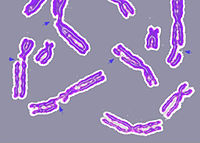
Photo from wikipedia
Leukemia cells accumulate DNA damage but altered DNA repair mechanisms protect them from apoptosis. We showed here that formaldehyde generated by serine/one-carbon cycle metabolism contributed to accumulation of toxic DNA-protein… Click to show full abstract
Leukemia cells accumulate DNA damage but altered DNA repair mechanisms protect them from apoptosis. We showed here that formaldehyde generated by serine/one-carbon cycle metabolism contributed to accumulation of toxic DNA-protein crosslinks (DPCs) in leukemia cells, especially in driver clones harboring oncogenic tyrosine kinases [OTKs: FLT3(ITD), JAK2(V617F), BCR/ABL1]. To counteract this effect, OTKs enhanced the expression of DNA polymerase theta (POLq) by ERK1/2 serine/threonine kinase-dependent inhibition of c-CBL E3 ligase-mediated ubiquitination of POLq and its proteasomal degradation. Overexpression of POLq in OTK-positive cells resulted in efficient repair of DPC-containing DNA double-strand breaks (DSBs) by POLq-mediated end-joining (TMEJ). Transforming activity of OTKs and other leukemia-inducing oncogenes, especially of those causing inhibition of BRCA1/2 -mediated homologous recombination (HR) with and without concomitant inhibition of DNA-PK -dependent non-homologous end-joining (D-NHEJ), was abrogated in Polq-/- murine bone marrow cells. Genetic and pharmacological targeting of POLq polymerase and helicase activities revealed that both activities are promising targets in leukemia cells. Moreover, OTK inhibitor or DPC-inducing drug etoposide enhanced anti-leukemia effect of POLq inhibitor (POLqi) in vitro and in vivo. In conclusion, we demonstrated that POLq plays an essential role in protecting leukemia cells from metabolically induced toxic DNA lesions triggered by formaldehyde and that it can be targeted to achieve therapeutic effect.
Journal Title: Blood
Year Published: 2022
Link to full text (if available)
Share on Social Media: Sign Up to like & get
recommendations!